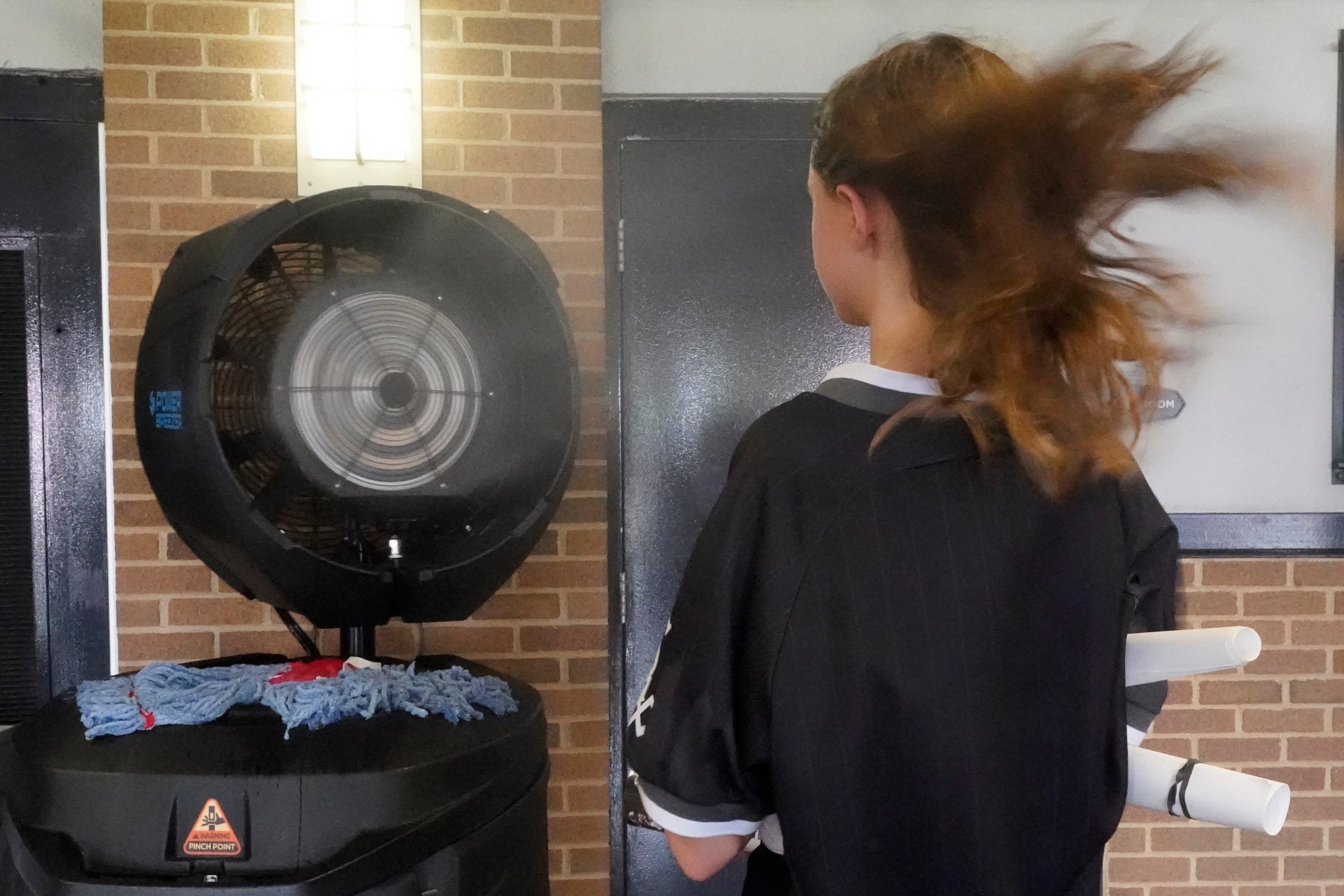Dangerous heat wave from Texas to the Midwest strains infrastructure, transportation
Temperatures are soaring in the Midwest and Texas

Your support helps us to tell the story
From reproductive rights to climate change to Big Tech, The Independent is on the ground when the story is developing. Whether it's investigating the financials of Elon Musk's pro-Trump PAC or producing our latest documentary, 'The A Word', which shines a light on the American women fighting for reproductive rights, we know how important it is to parse out the facts from the messaging.
At such a critical moment in US history, we need reporters on the ground. Your donation allows us to keep sending journalists to speak to both sides of the story.
The Independent is trusted by Americans across the entire political spectrum. And unlike many other quality news outlets, we choose not to lock Americans out of our reporting and analysis with paywalls. We believe quality journalism should be available to everyone, paid for by those who can afford it.
Your support makes all the difference.Temperatures have soared in the Midwest and Texas, with more dangerous heat expected, a national weather service official said.
The harsh heat wave has damaged roads, water lines and forced the evacuation of a nursing home this week as some cities brace for triple digit temperatures through August. In Nebraska, a 1-year-old left in a hot van died, and in Texas, temperatures have broken records.
The heat is expected to become “dangerous to the average person” if they don't have air conditioning, said Alex Lamers, warning coordination meteorologist at the National Weather Service's Weather Prediction Center.
It has felt hotter than 110 degrees in cities in Texas and Louisiana more often than at any time since World War II, Lamers said. The brunt of the enduring heat has hit states from Florida to New Mexico, he said.
The Electric Reliability Council of Texas asked residents twice last week to conserve energy because of high demand and low reserves. The agency issued a weather watch from Wednesday to Aug. 27.
The council hasn't had an outage all summer despite unrelenting heat and high demand, said Alison Silverstein, a Texas-based independent energy analyst and former adviser to the state’s energy regulator.
But there are risks the longer this drags on, Silverstein said, comparing it to a car overheating.
“At least your car on a long trip has a chance to rest overnight and cool off,” she said. “A lot of these plants have been running nonstop, or pretty close to it, since June.”
Experts warn infrastructure like roads can buckle under the extreme strain of enduring and recurring heat waves brought on by climate change. Union Pacific has imposed more speed restrictions this summer across its network of more than 32,000 miles (51,499 kilometers) of Western track as a “precaution to reduce the impact on the rail when it gets hot,” spokeswoman Kristen South said Tuesday.
Costs in the U.S. for road maintenance and replacement due to rising temperatures could reach $26.3 billion by 2040, with most of the damage expected to hit Texas, California and Illinois, according to a 2017 study by University of Arizona and Arizona State University researchers.
The heat has already caused an unusual number of Texas water line breaks and roadway issues.
Texas officials are monitoring the heat, roadways and tips from residents to address issues as quickly as possible, said transportation department spokesman Danny Perez. Houston officials learned of likely heat-related damage to a road Sunday after about 10 other similar reports in June, he said.
Houston's high temperatures and a lack of rain have caused the ground to shift and damage the city’s aging pipes. Residents' top service request is for water leaks, according to city data. Reports of water leaks from the past month were up 25% from the same period last year.
Demand and leaks are both increasing, and the city is using emergency purchase orders to add contractors for repairs, said Erin Jones, Houston Public Works spokeswoman.
San Antonio Water Systems has already tallied more breaks this month than in all of July, said the agency Wednesday. Customers need to cut back on outdoor watering, the agency said.
Cooling systems are also under strain. Missouri firefighters helped remove 117 patients from a Kansas City nursing facility Tuesday after the air conditioning failed in temperatures that felt as high as 115 degrees (46.1 C). Most Parkview Healthcare nursing facility residents were taken to other facilities, but seven who had COVID-19 were taken to hospitals, authorities said.
At least 20 complaints have been made against the facility in the past five years, since August 2018, according to the Missouri Department of Health and Senior Services.
Denise Oates, whose mother lives at the facility, told television station WDAF that it was upsetting to learn through social media that the air conditioning failed. She called and couldn't get any answers about what was happening, Oates said.
“I’m just like, ‘Call me and let me know before you move her. I need to know where she moves to,’” Oates said.
The facility and owner, Cor Healthcare Partners based in Baltimore, did not immediately respond to requests for comment.
Not everywhere has been feeling the heat. In North Dakota, the city of Dickinson set a record of 60 degrees (15.6 C) for Aug. 20, beating the benchmark of 62 in 1974. On the same day, Bismarck tied its record of 62, set in 1966. The temperatures on Sunday were due to
An unseasonably cool air mass, clouds and rain helped bring temperatures down Sunday, but warmer temperatures are forecast in the coming days, said Corey King, an emergency response specialist with the National Weather Service in Bismarck.
——
Associated Press writers Paul Weber in Austin, Margery Beck and Josh Funk in Omaha, Nebraska, and Jack Dura in Bismarck, North Dakota, contributed to this report.